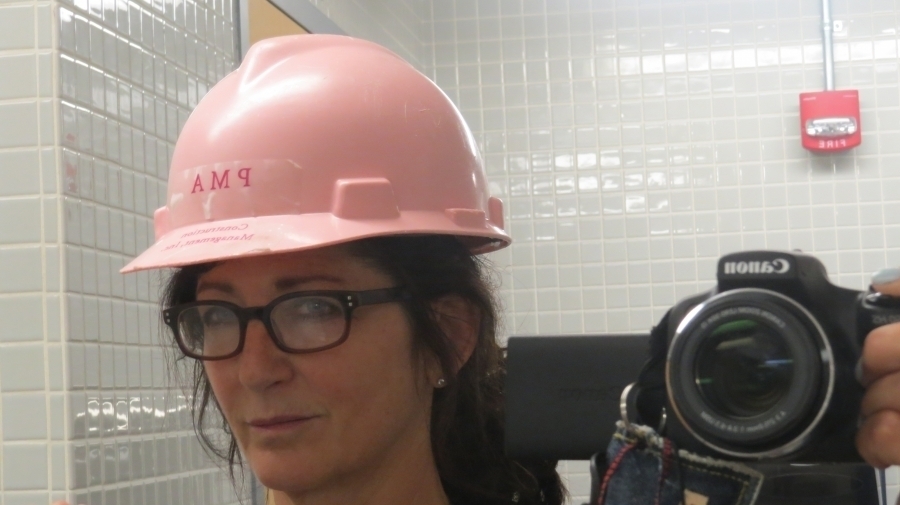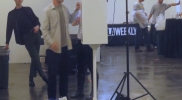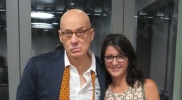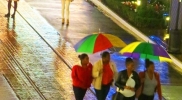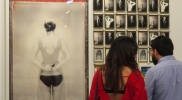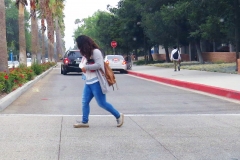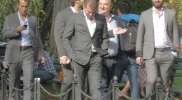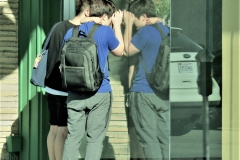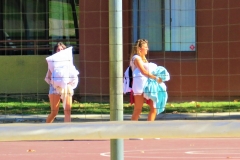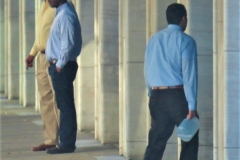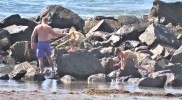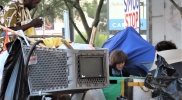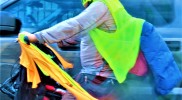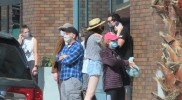|
|
Best Trivia - Inventions
| Favorite Trivia – INVENTIONS & DISCOVERIES
|
|
Two of the most adverse 20th century environmental impacts were invented by the same mechanical engineer/chemist, Thomas Midgley. 1) Lead (tetraethyllead) in gasoline to prevent engine knock and 2) Freon, a chloroflorocarbons (CFC), used as a gas refrigerant. Ironically, one of his other inventions was the death of him, literally. After contacting polio, he created a motorized pulley system to lift and turn himself in bed. Unfortunately, he was caught in the ropes and strangled.
A Short History of Nearly Everything – Bill Bryson
|
FIRSTS: First telegraph message by Morse (using dots, dashes & spaces): “What hath God wrought?”
First telephone message by Alexander Graham Bell (using tongue, lips & pharynx): “Mr. Watson-come here-I want to see you.” |
| “What can you conceive more silly and extravagant than to suppose a man racking his brains, and studying night and day how to fly?”
A Serious Call to a Devout and Holy Life (1728) – William Law
|
| “Mistakes are the portals of discovery.”
James Joyce
|
| “Whenever man comes up with a better mousetrap, nature immediately comes up with a better mouse.”
James Carswell
|
| California’s Gold History: James W. Marshall discovered gold while overseeing the construction of the Sutter Saw Mill on the American River in 1948. Word soon spread and by 1849 thousands of prospectors, who became known as The 49ers, were flocking to the Coloma, California site of Sutter’s Mill, and the surrounding region, hoping to strike it rich.
The same year, the Mexican-American war was formally concluded by the Peace treaty of Guadalupe-Hidalgo in 1848. The United States received the disputed Texan territory, as well as New Mexico and California. The Mexican government was paid $15 million, the same sum issued to France for the Louisiana Territory.
On September 9, 1950, California was the 31st state admitted to the Union. |
| Lost and found department: “Where people bring things they’ve found and can’t use.” – Peter Nero
Leonard Louis Levinson – Webster’s Unafraid Dictionary: Defiant Definitive Put-Downs
|
| Alfred Nobel was the Swedish inventor of dynamite, nitroglycerin and other explosives. The first Nobel prizes were awarded in 1901 and include 5 prizes, i.e., Peace, Literature, Medicine, Chemistry, and Physics. FYI, the Nobel prize cannot be bestowed posthumously nor to more than 3 people.
Rodale’s The Phase Finder
|
| “Holzer is going to use the old laboratory for the purpose of hatching chickens artificially by an electric incubator. He is very enthusiastic. Gave me full details. He is a very patient and careful experimenter. Think he will succeed. Everything succeeded in that old laboratory. Just think electricity employed to cheat a poor hen out of the pleasures of maternity Machine-born chickens! What is home without a mother!” [July 12, 1885]
The Diary of Thomas Alva Edison
|
| “I learned the girls how to make shadow pictures by use of crumpled paper. We tried some experiments in mind reading which were not very successful. Think mind reading contrary to common sense, wise provision of the Bon Dieu that we cannot read each other’s minds, twould stop civilization and everybody would take to the woods. In fifty or hundred thousand centuries when mankind have become perfect by evolution then perhaps this sense could be developed with safety to the state.” [July 16, 1885]
The Diary of Thomas Alva Edison
|
| “The first spectacles in England were hugely ridiculed. Physicians scorned then and feared them, and stuck to their eye ointments and lotions. The clergy violently opposed them, saying it was impertinent defiance against the hand of God to try to restore failing sight. . . Gradually, of course, people needing visual aid tried them and the spectacles themselves won out over opposition and ridicule. . . Credit for the perfection of glass lenses to aid sight is given to America. Benjamin Franklin invented bifocals in 1784.”
Maria Leach – The Soup Stone: The Magic of Familiar Things
|
|
“Cousin Allan has a toy that I never tire of looking at. It is a small, inexpensive toy; in fact, it is only a stick of wood about the length of my hand. But the remarkable thing about it is that it can fly. At one end of the stick is a small wheel with eight tiny wings made of stiff paper. At the other end is a little ‘winch’ of steel wire, and between the wheel and the winch runs an elastic band. When Allan wants the stick to fly he turns the winch round and round until the rubber band is stretched to its utmost. He twists the winch until it can’t turn, and puts the toy down. The rubber band begins to lose its tautness, thereby setting the paper wheel in motion. It turns very fast and, after two or three revolutions, it shoots upward, drawing the stick along. If the band has been drawn tight enough, the stick goes up all the way to the ceiling, flying back and forth up there, knocking against the plaster, as if it would bore its way out to the open. As the toy rose to the ceiling it flashed upon me that one ought to be able to make a real flying machine – one that could be used by man, with the little flying stick as a pattern. At first I thought that this was just nonsense; but now I’m beginning to wonder if it wouldn’t be a good idea. It would be a great pleasure for us human beings to be able to travel by air. But I don’t believe the big gas-filled balloons have any future. They are forever bursting, and even if they do not burst they move with the wind and are carried hither and thither, no one knows where. But if one had a large enough wheel with steady wings and a connecting rod, like the wheel on a spindle, at which one could sit and work with the feet to make the wheel resolve, I think that would be a good flying machine.”
The Diary of Selma Lagerlöf – Selma Lagerlöf
|
|
“My first boat sank. I was six years old [1972] and had hammered it together from old orange crates and split firewood, sealing the cracks with bumper stickers from an Ann Arbor City Council candidate named Ulrich Stoll… Afterward, I wheeled the boat home on my wagon and junked it behind our garage. But I wasn’t discouraged. I was happy—I had built a real boat! And I was already thinking about my next one I would just have to build it out of something guaranteed to float, no matter what.
“I eventually settled on wine corks… From then on, all my parents’ corks went into a wooden bowl on the kitchen counter. To them, whether or not I could ever save enough corks was irrelevant. In our family, imagination itself was a prime virtue, and they encouraged my older sister, Sara, and me to let ours run free. In a home governed largely by expectations, not rules, I can remember only one explicit mandate from my mom: we weren’t allowed to get bored…
“When I was eleven, we moved to England for a year… In a few horrible moments, my whole life changed. Leaving England, we took a family trip to India… my parents hired guides to take us all pony-trekking up into the Himalayas. Crossing a swollen river, Sara’s pony slipped on a rock and threw her into the rushing waters. My dad and two of our guides sprinted in to save her, but the thundering rapids and boulders overwhelmed them. Sara, along with one of the men who tried to save her, hit the rocks and was swept away. We searched the river for two days as we hiked out, but never found them. She was fourteen.
“‘All cork?’ Officer Carter asked. ‘Solid Cork!’ I answered. For once, I omitted the fact that the boat consisted of 165,321 separate corks, 15,000 rubber bands, and not a drop of glue.”
[Corks were collected and donated, the majority from Cork Supply USA; rubber bands were donated by The Alliance Rubber Company. Volunteers helped assemble ten hexagonal logs of corks and enclosed them in netting. Cork Supply sponsored the cork boat trip across Portugal—down the Douro River, which successfully launched in Summer of 2002.]
|
|
ingenuity – “The art of turning stumbling blocks into stepping stones.”
Leonard Louis Levinson – Webster’s Unafraid Dictionary: Defiant Definitive Put-Downs
|
|
“TELEPHONE: The ‘do-it-yourself’ craze has invaded telephony. But the customer has to do the work without getting a reward for his efforts. The telephone companies do not reduce the rates. They make you work and claim they give you ‘progressive convenience’ long distance dialing. With cunning you can actually materialize a living voice responding to your dialing finger. But no sooner have you sighed forth the name, the number and the town you want to contact, than the ghostly voice intones: Do it yourself! Instruction is not included in the kits. You have to ask how to proceed, spell town, spell state, spell out where it is near, give lessons in geography. The ‘just a moment’ is the only reminder that you are not talking with a mechanical device.
“After the first half hour of your waiting you think fleetingly of hanging up the receiver, but horror strikes you instantly because you know, only too well, that you might never raise the ghost again. You wait and dream. You dream of times when you could give name, town, in cable style to a polite ear on the other end and hear: ‘We’ll call you when we have the party on the line.’
“Suddenly a bad-humoured specter enters your reverie, rattling off numbers that you must dial.
“And you dial them, good progressive sport that you are. A sudden outburst of all oceans surging into a storm knocks the receiver off your ear. Then silence, then a crackle, then a sweet melody played on a xylophone and then—no ring.
“You think: patience, patience, patience. Then you realize that you are holding the dead end of a long dead line. You hang up. You look at the clock. You’ve spent three quarters of an hour. You are nowhere. You try again. The sound you hear you do not analyze. It may be living, it may be dead; it doesn’t matter. The voice says: You can dial that number yourself. You say: I’ve tried. I got the oceans, the crackles, the music, the silence—but never a ring. The voice says: dial it again. Are you sure you dialed the correct number??? (That rise in the voice means nothing. The recorded voices do that too.) It’s a record, you think. I am pleading with a record. You say: Please help me get the number. The answer: We are not supposed to dial. Do it yourself.
“You carry on. You dial this, you dial that. The sounds that greet you vary. But all have this in common: They carry no resemblance to a ring. Your daring finger dials the specter’s number. You tell your story. Urgency speeds your words. The answer, staccato, impersonal: Talk to your special operator. I cannot dial the special operator for you. Do it yourself…”
Marlene Dietrich’s ABC
|
|
“Leontino came to invite us to attend the inauguration of the telegraph they are putting in his house, and he said that Aunt Aurélia was waiting for mama and all the family with acarajés, biscuits, and chocolates. We all went, Dindinha, too. Half of the people sat in the parlor and the other half in the dining-room at the end of the hallway, which is very long. Those in the parlor sent a telegram to those in the dining-room, and the answer was written in dashes that the pen made on a strip of paper that Sergio read out loud, and it was perfectly right. Dindinha, mama and my aunts were open-mouthed to see how the messages were correct, the way the telegraph does it.” [February 23, 1893]
The Diary of “Helena Morley” – trans. & ed. by Elizabeth Bishop
|
| “Once again, on April 12, 1961, the Soviet Union scored a dramatic first in the conquest of space. On that day, Major Yuri Gagarin, the Soviet cosmonaut, became the first man to orbit Earth in a space vehicle. In one dramatic flight, he shattered any reservations about man’s ability to survive at least a short duration of weightlessness. The flight constituted a full Earth orbit and proved conclusively the advanced state of Soviet technology in the missile and space field. Worse yet, the Soviet space vehicle that carried Gagarin into space compared to the United States Mercury spacecraft somewhat like a Lincoln Continental to a Model-T Ford… It had been clear for some time that the Soviet planned to go to the moon. As early as 1953, A.N. Nesmeyanov, President of the Soviet Academy of Sciences, proclaimed, ‘Science has reached a state when it is feasible to send a stratoplane to the moon, to create an artificial satellite of the Earth.’… President Kennedy had been in office only a short time, but he understood the need to meet the Soviet threat in space.” [April 12, 1961]
Inside The Space Race: A Space Surgeon’s Diary – Lawrence E. Lamb, M.D.
|
| “I wonder why pregnancy tests have the names they do. First Alert. Early Response. Like smoke detectors, is there a fire here? And why do they display their findings in such unimaginative symbols—crosses, dots, slashes? If I could design the perfect pregnancy test, its results would read at once primitive and poetic, an image of a rocking horse for yes, a martini for no.” [September 21, 1998]
Love Works Like This – Lauren Slater
|
| “The oldest recording of a human voice is thought to be that of a woman singing the French folk song ‘Au Clair de la Lune.’ The ten-second clip was recorded on April 9, 1860, using a phonautograph, a device created by French inventor Édouard-Léon Scott de Martinville. The discovery of the recording, which predates that of Thomas Edison singing ‘Mary Had a Little Lamb’ by seventeen years, was announced at a conference of the Association for Recorded Sound Collections, at Stanford University, on March 28, 2008.”
Leonard S. Marcus (The Annotated Phantom Tollbooth by Norton Juster)
|
| “Ben Franklin was a man of many firsts. He founded the first public library, the first volunteer fire brigade, the first fire insurance company, and the first free hospital in the United States. He was the first to demonstrate that lightning was a form of electricity, the first to identify positive and negative electrical currents, and the first to differentiate materials that did conduct electricity from those that didn’t. He invented the first bifocal glasses, the first clean-burning stove, and the first lightning rod. In 1751, twenty-five years before he helped write the Declaration of Independence, he was the first to suggest that the British colonies in America band together in a confederation to look after their common interests. . . “Franklin penned his almanac [Poor Richard’s Almanack] under the pseudonym Richard Sanders. . . He intended the almanac to be a source of practical information as well as a ‘vehicle for conveying instruction among the common folk’. . . It was another of Franklin’s firsts: America’s original self-help book.”
Geary – The World in a Phrase: A Brief History of the Aphorism
|
| Amina Khan: “Are there aspects of our lives today that you think our children and children’s children will look back on and see as backward, or even barbaric?” Michio Kaku (thoretical physicist): “Take a look at chemotherapy. It’s a horrible process—your hair falls out, you vomit—but it’s a necessity to fight cancer.
“In the future, we’ll have nanoparticles that can zap cancer cells, individually, one by one. Those are molecules that home in on cancer cells like smart bombs. In one trial, they were found to be 90% effective against tumors. When we have the capability to knock out cancer cells one by one, we will view chemotherapy like we view the leeches and bloodletting of a hundred years ago.”
The Los Angeles Times, June 4, 2011
|

Comments are closed.
|
|








